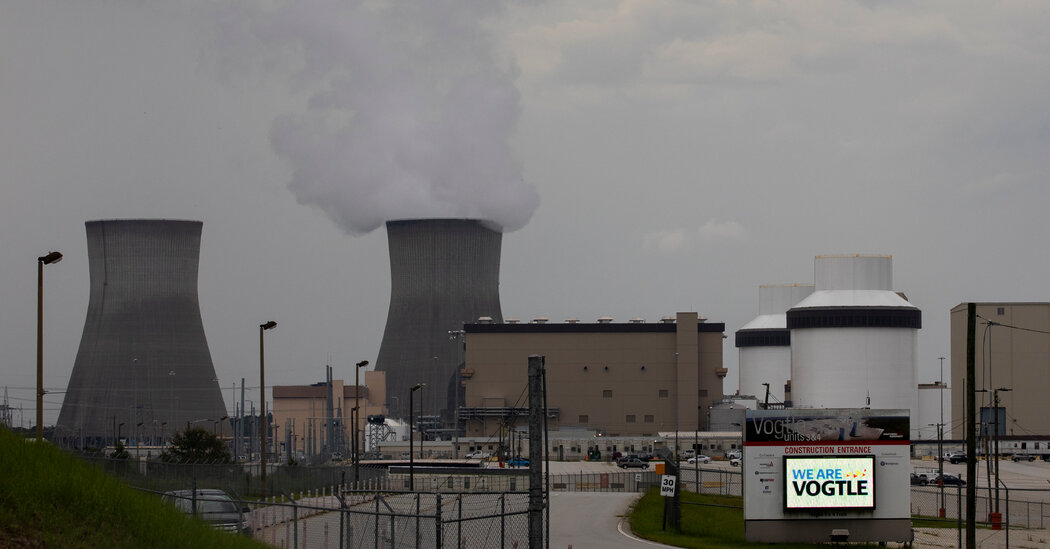- cross-posted to:
- nyt_gift_articles@sopuli.xyz
- climate@slrpnk.net
- cross-posted to:
- nyt_gift_articles@sopuli.xyz
- climate@slrpnk.net
Measures moving through Congress to encourage new reactors are receiving broad bipartisan support, as lawmakers embrace a once-contentious technology.
The House this week overwhelmingly passed legislation meant to speed up the development of a new generation of nuclear power plants, the latest sign that a once-contentious source of energy is now attracting broad political support in Washington.
The 365-to-36 vote on Wednesday reflected the bipartisan nature of the bill, known as the Atomic Energy Advancement Act. It received backing from Democrats who support nuclear power because it does not emit greenhouse gases and can generate electricity 24 hours a day to supplement solar and wind power. It also received support from Republicans who have downplayed the risks of climate change but who say that nuclear power could bolster the nation’s economy and energy security.
“It’s been fascinating to see how bipartisan advanced nuclear power has become,” said Joshua Freed, who leads the climate and energy program at Third Way, a center-left think tank. “This is not an issue where there’s some big partisan or ideological divide.”



How so? Renewables produce electricity at a much cheaper rate. Meeting rising energy demands is easier with cheaper production.
Solar has had impressive growth, but the land use needed to actually meet all electrical demand is a lot. Solar still needs a backup solution, battery tech to solve this doesn’t exist and any realistic cost estimate is on par with nuclear.
It’s going to take decades to build enough panels anyway, so we might as well build some nuclear anyway. It significantly reduces the amount of solar needed.
You don’t have to dedicate the land solely to solar. There are many places where it can improve the environment/efficiency through dual use, e.g. parking lots or even fields with animals. Many places also have more than enough space to dedicate to it. I don’t see this as a real problem.
Nuclear also needs a backup solution (e.g. due to summer heat or maintenance). Battery tech has improved massively over the last years, and grid-level storage is being deployed as we speak. A new nuclear plant doesn’t have to compete against current batteries - it has to compete against the batteries we’ll have built by the time the reactor is finished. Even if the cost estimates right now are on par with nuclear, they won’t be in a couple of years.
Solar (and other renewables) are much faster to deploy than nuclear reactors are. In the same time, and with the same resources you’ve spent on a reactor, you could have built multiple times the generation capacity in renewables.
Sure, as does any other power source. But we should go for the cheapest and quickest solutions - and nuclear fission isn’t, and will most likely never be, either of those.
I love it. All of civilization has to be redone just to get around using nuclear power and meanwhile people like you are complaining about how much work nuclear takes.
What are you talking about? Which part of which civilization has to be “redone”? I genuinely have no idea what you could be trying to express here. Nuclear power currently makes up roughly 10% of global power production - it’s not just small, it will keep getting smaller because it’s fundamentally not economic.
Reaping double benefits from dual land use isn’t “redoing all of civilization”, it’s “not being stupid and taking an opportunity when you see it”.
I’m not “complaining about how much work nuclear takes”. My whole point is very simple, but I’ll gladly repeat it:
Do you understand now? If you’re willing to look at this objectively, nuclear simply doesn’t make sense.
Fine show me the battery infrastructure to support it
No thank you, you are not a person worth wasting time on :)
Have fun supporting big coal